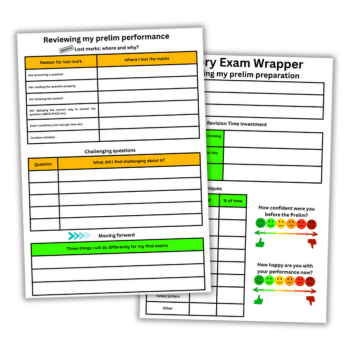Exam stress – Strategies for supporting student wellbeing

Students’ exam anxiety can be self-defeating – which is why we all need to help students keep exam stress at bay…

- by Teachwire
- Classroom expertise and free resources for teachers

Exam season is no walk in the park and causes at least some stress for the majority of pupils. A recent review of the curriculum and assessment system led by former Education Secretary, Charles Clarke concluded that “the current volume and density of examination at GCSE and for vocational Key Stage 4 qualifications is too high, with students taking an average of 31.5 hours of exams each.”
At the end of KS4, there are, quite simply, lots of exams, and they come thick and fast. Therefore, it’s extremely important that your students are fresh and ready in May and June.
Here we provide some proactive strategies for alleviating the burden of exam stress and fostering a supportive environment for your students…
Helping students avoid stress and exhaustion
Rebecca Leek looks at what you can do when students’ determination to do well in their exams tips over into something more destructive…
Quality over quantity
Start by helping your students experience the feeling of efficient self-study. Walk them through some methods in class, let the students reflect on them, and how they might replicate them independently. Three to try might include:
1. The Pomodoro Technique
Officially, this involves studying for 25 minutes, followed by a short break, followed by another 25-minute block, but formulas can vary. It’s essentially chunking time, rather than just letting an hour or so drag through with diminishing returns.
2. Multimodal learning
This entails mixing up reading, talking, writing, drawing and any other medium that works for you. Select some content, then challenge your students to read about it, write about it and ask each other questions about it.
3. Swallow the frog
Help your students identify the topics and areas they’re least secure about and most keen to avoid. Whether it’s the future tense, how the heart works or their least favourite type of question – swallow that frog!
Timetabling
Help students map out how they will tackle different subjects. As a single subject teacher, you may know when your subject’s exams fall, but how do they fit around the others?
Find out whether your students have worked out how to handle all the demands on their time. I like to use a timetable that works backwards from the last exam, with lots of interleaving.
This might sound obvious to some of us, but if organisation and seeing the bigger picture doesn’t come easily, help students see how they can assemble a jigsaw out of their revision workload; otherwise, there’s a risk of them becoming completely overwhelmed.
Planned down-time
It’s all very well scheduling in (essential!) downtime, but when there’s no plan for such time, those blank afternoons can become the periods when stress really starts to build.
Students can end up swimming in a stagnant soup of preoccupation – about the looming exam season, or about how they’re not revising. Then the phonescrolling begins, and that listlessness can breed a sense of hopelessness.
Ask your students – ‘What do you do when you take breaks? Do you make a plan, and what different things can you do to make downtime genuinely restful?’
Body and mind
Inactive bodies do nothing for our mental health. Talk to your students about the various ways in which they can keep active. You could even show them by taking them out for a walk.
Our local high school organises a sponsored 10-mile walk each year – something like that can show many ‘non-sporty’ teenagers how activity can take many forms.
Do they know where they can go in their local area and feel safe? Does your school do enough in terms of providing recreational activities for exam year students?
Flipping rewards
The ultimate reward for highly motivated students is the grade, or the doors that exam grades might open for them.
They have a mental picture of where they want to get to, and that’s a healthy driver. Until it isn’t healthy any more.
For those who have lost their sense of balance and started sinking into patterns of overwork, can you help them flip the rewards?
That is, they get a reward for taking a walk, or for stopping every 40 minutes for a half-hour break (rather than a reward for revising).
Long distance runners use a similar strategy, whereby a slow run – which actually has many benefits, but is often dismissed by people too fixated on speed – is set as their weekly goal. Being slow becomes the thing that gets that mental gold star.
Catastrophising
If you have a student who has become so stressed that they’ve reached the point of catastrophising – ‘I’m going to fail everything!’ – do you have some techniques to support them in this state?
Listen and acknowledge what they’re saying, but also gently challenge them: ‘What makes you think you will fail? Which subjects will you definitely not fail? How can we make sure you pass at least one?’ And so on.
Finally, ask them about their sleep. This is something I’ll always come back to, because sleep quite literally repairs our brains. If a student is looking ragged, work on this first of all. It’s absolutely essential for getting them ‘race-ready’ ahead of that busy exam season.
Successful sleep
Respecting how our natural body clocks respond to light and dark makes for a better night’s sleep and a healthier, more sustainable lifestyle.
Observe how deciduous trees respond in the autumn – they sense the light changing, and their biology kicks in. We respond to light too, so get outside when the sun is coming up in the morning. Even if it’s just for just a few minutes.
Decide on a place where you’ll keep your phone or tablet overnight – preferably somewhere other than your bedroom. This means you won’t dive into doomscrolling as soon as you wake. Besides which, reading a book at bedtime without a backlit screen is far better for your brain.
Be very careful with naps. They can be brilliant, but get them wrong, and you’ll lose time in the day you didn’t mean to (stress!) and be unable to get to sleep properly at night (more stress!).
There’s research that says a 20-minute power nap can work wonders, so be disciplined and set an alarm.
Rebecca Leek has been a primary and secondary teacher, SENCo. headteacher and MAT CEO; she is currently the Executive Director of the Suffolk Primary Headteacher’s Association.
Case study: Stephen Perse Cambridge

Abbey Jones looks at how to help students feel relaxed, supported and secure in their wellbeing as exam season unfolds…
As exam season approaches, many schools will see heightened stress levels among their students.
That’s understandable, of course, given that these young people will have worked hard to get to this point. They want to give the best possible account of themselves throughout their assessments.
At Stephen Perse Cambridge, we take great care in creating an environment during exam season that promotes a positive and optimistic approach.
Our ambition is to provide a supportive and relaxed culture during the exam term that helps students feel able to rise to the challenge of the assessments, without experiencing any detrimental impact to their wellbeing.
Cumulative experience
Creating a support system that is available to every student throughout their school experience, not just during exams, has been the cornerstone of this work.
Every summer during their time at Stephen Perse Cambridge Senior School, students in all year groups get to experience assessments. We conduct these with an age-appropriate level of formality. They become increasingly similar each year to the summer exams they’ll eventually sit, culminating in their Y11 GCSE mocks.
These assessments mirror the experience of the real thing as closely as possible. It’s a process that ensures students are well-practised at preparing for, and working through the exam period. They’ll develop techniques and build resilience to help manage the stress of exams throughout their school careers.
We prioritise open communication with our parent community around mental health to try and reduce any associated stigma.
We want parents to feel they can share any concerns about their child’s wellbeing with us. This is so that we can best support their children throughout their whole school experience.
One way in which we do this is by keeping parents informed about our various initiatives in this area – from wellbeing talks, to new PSHE modules.
This way, parents can better understand the school’s ethos when it comes to wellbeing in general. This sets the tone for our approach to the increased stress of exam periods.
Flexible independence
A flexible study leave period before GCSEs and A Levels is also essential in empowering students to prepare and revise in a way that suits them.
During study leave, our students can choose the learning environment which works best for them. This might be a silent study room, group work spaces at school, the family dining table, their bedroom, the local library or a mix of all the above.
Trending
Staff across all subjects hold optional revision lessons that students on study leave can attend. They are available to answer any emailed questions from students as they revise.
At this time, promoting students’ wellbeing is just as important as their revision’s content coverage. That’s why we deliver workshops on the challenges of exam season, such as what they should expect on the day and how to manage exam anxiety.
Looking ahead
Students are also strongly encouraged to set aside time and space for their hobbies and other interests, plan in adequate breaks and continue socialising with friends and family.
One key piece of advice we remind all students of is that no matter how they feel an exam went, once it’s done they need to put it behind them and look ahead to the next day.
Staff need to reassure students that feeling anxious ahead of exams is completely normal. It doesn’t necessarily constitute an anxiety disorder or similar.
These conversations don’t have to take the form of a PSHE talk. Our pastoral staff and subject teachers all regularly encourage open conversations at all times with students around how they’re coping during exam term.
At Stephen Perse Cambridge, we’re keen for subject teachers, form tutors and heads of department to be present on exam days. This is so that students are reminded that we’re behind them.
Those final words of encouragement really can make all the difference to their mindset as they head into that exam room.
Abbey Jones is senior deputy head 11-18 at Stephen Perse Cambridge Senior School; for more information, visit stephenperse.com
How an ‘examiner’s mindset’ can help your GCSE prep
Students’ exam anxiety can be self-defeating. That’s why schools should have their own GCSE prep strategies ready to go, says Stephen Caldwell…
The weeks and months leading up to examinations are filled with excitement and opportunity. However, there’s also anxiety, fear and exam stress.
Pupils ride this emotional rollercoaster several times in their schooling career. But teachers endure it year after year, as they enter one cohort of students after another for their GCSEs and A Levels.
As a teacher myself, I was always struck by the way exam stress would inhibit my students’ ability to learn in the lead-up to tests.
It becomes a self-fulfilling cycle. Pupils are nervous about taking their exams and the exam stress consumes them. This makes it difficult to study and prepare, which serves to only intensify that fear even further.
Exam stress is rooted in uncertainty and fear of the unknown. By demystifying exams with an examiner’s insight, and helping students replace their fear with self-belief, teachers can create calm, confident and capable students who are fully ready to tackle their examinations.
The examiner’s mindset
It was once commonplace for examiners from various exam boards to visit schools and share their wisdom with both pupils and teachers. They gave them the inside track on what examiners would be looking for.
As this practice has gradually fallen out of fashion, so too has the proportion of teachers who, like myself, opt to also work as examiners.
This is a natural consequence of the mounting pressure on the teaching workforce. Unfortunately, it means that we’re steadily losing this form of ‘examiners’ knowledge’ from schools.
Pupils benefit from hearing directly from examiners because they can dispel some of the mystery that shrouds exams.
Pupils will be far less afraid to take their exams if they know exactly what skills are being tested in the questions, how the marking scheme works and how to utilise their knowledge to maximise their marks.
Being a GCSE English examiner enabled me to dispel these mysteries for my own class. Once I was able to explain to pupils how they could score 16 marks in the first seven sentences of their GCSE creative writing paper, their fear was quickly replaced by excitement.
They became alive to the possibilities of what they could create, confident in the knowledge that success was perfectly achievable.
“They became alive to the possibilities of what they could create”
‘Insider’ insight
That same principle applies to all subjects. In maths, most students will grow impatient and disheartened when unable to arrive at an immediate answer. They may stop attempting the question.
Once we unveil the way examiners award marks, pupils will soon learn that the answer is actually just one small component of what the question is really asking.
The key to confidence in maths lies in beginning with what a student already knows. This is a process that can begin by, say, labelling a diagram and engaging with the material presented, without worrying about the question itself. With this first step complete, the path to the answer will eventually reveal itself. This is a far more comfortable approach for pupils to pursue than the ‘all or nothing’ alternative.
The priorities and practicalities at play within the education system may have changed. But it’s still possible for schools to gain some level of ‘insider’ insight by inviting examiners to visit. Alternatively, seek out specialist support with the aid of your National Tutoring Programme funding.
Strategic revision
Once you’ve lifted the veil, you can embed these exam preparation principles in a strategic revision programme that teaches pupils how to apply their existing knowledge of the curriculum to meet the examiner’s requirements.
Teachers can design this revision programme using data based on target grades, mock or weekly test data, and question level analysis, all grounded in forensic knowledge of the different exam boards.
Crucially, a school-designed revision programme should never include ‘cramming’. The aim isn’t to simply recall as many facts as possible. Instead it’s to gradually consolidate classroom learning, provide practice in applying this knowledge to an exam paper and address any anxieties head on.
Regular mock testing is an essential component of revision. Frequent testing will provide pupils with opportunities to learn how to maximise their chances of success. The experience will also allow them to develop resilience, learn how to persevere when a first attempt proves unsuccessful, and develop their own strategies for overcoming challenges.
Harness exam stress
Teachers can facilitate this process by sandwiching mock exams with pre- and post-assessment activities. Set aside time for pupils to self-reflect and self-identify their needs, thereby making them partners in the revision process. This, above all, enables pupils to develop the self-confidence they’ll need to harness feelings of exam stress towards positive ends, and potentially even thrive on being tested.
Mock testing also gives teachers valuable insights into pupils’ strengths and areas for development. This can in turn help to identify problem areas across the cohort and support targeted intervention.
It’s an unfortunate reality that as things currently stand, ‘failure’ is essentially baked into our education system. We know that examiners will award around a third of pupils grades 1, 2 and 3 in English and maths before students have taken any GCSE papers.
This means that every year a choice is made to fail a third, in order for two thirds to pass. It’s a system that contributes to a cycle of low self-esteem that’s particularly pernicious for disadvantaged pupils, who are overrepresented in that third who ‘fail’.
One of the most powerful ways of supporting students is to demonstrate your total and unconditional faith in their ability to achieve success. Constant positive reinforcement over time, coupled with a clear structure for revision and techniques to aid effective study, can help to break down students’ self-imposed barriers. It can enable them to unlock their true potential.
Success within reach
Over the years, my colleagues and I began making our classroom spaces available to students on exam days. This was so that they could have a place in which to chat and mentally prepare themselves.
Some pupils would use the time to ask us for advice. But our main role was to provide a smiling, positive presence. It was reassuring for students to simply know that we were ‘in it with them’. And that we’d be waiting for them on the other side to hear about their experiences.
There are many ways of providing this kind of support. But no matter what form it takes, demonstrating that you care and reinforcing that positive relationship, right up until the very end, is vital.
A calm, confident and capable student is one who will walk into an examination room knowing exactly what’s needed from them and how to deliver it. No amount of cramming the week before an exam can create this mindset; in anything, that will only serve to hinder it.
Exam confidence is the product of constant practice, relentless support, hard-won self-belief and above all, a detailed knowledge of the examiner’s mindset as they pick up their marking pen and open their first exam paper.
This confidence is within reach for each and every student. And with it comes the ability to achieve and succeed in their exams and beyond.
Stephen Caldwell is a former teacher and GCSE examiner, and co-founder of Impress Education; for more information, visit impress.education










